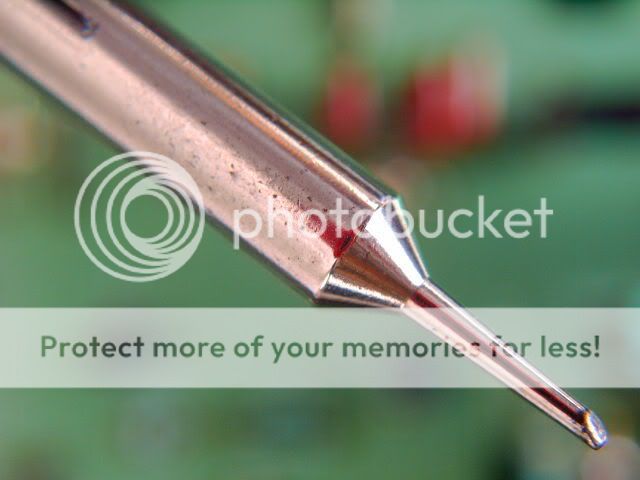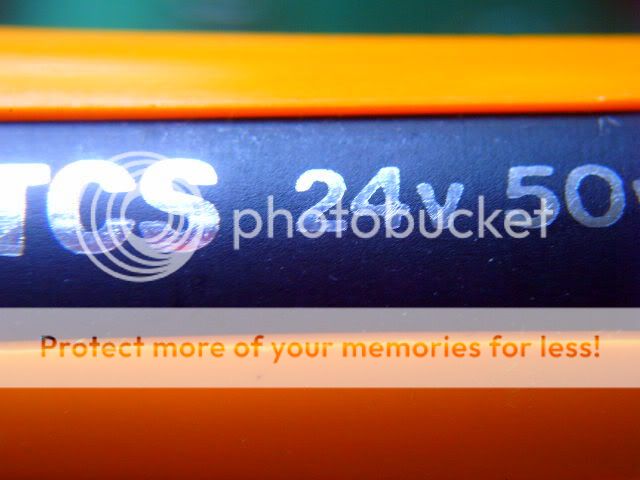You are using an out of date browser. It may not display this or other websites correctly.
You should upgrade or use an alternative browser.
You should upgrade or use an alternative browser.
Soldering Iron Power 25w, 30w, 35w, 40w or 60w ?
- Thread starter Leicaron
- Start date
Greg Erskine
pfm Member
I use 2, a big one and a little one.
Little one for small components / traces.
Big one for big components / traces / ground planes / wires.
Little one for small components / traces.
Big one for big components / traces / ground planes / wires.
Simon Dawson
Angry, Ill & Ugly
Lots of watts are good. Higher wattage irons do not necessarily operate at higher temperatures than low wattage ones. When in contact with any significant heat sink,i.e a hefty lead or large solderpad the temperature of a low wattage iron will drop lower and take longer to recover than a higher wattage iron. This means you need to keep the iron in contact for longer in order to get everything up to temperature so as to flow the solder (even more so if lead free solder is used) giving more opportunity to damage sensitive components. I use a temp controlled 50W one for most things and a cheapo 80W for speaker cable termination etc
Darth Vader
From the Dark Side
Get yourself a s/h Metcal SP200 off EvilBay. I paid £35 which is a steal but the tips come extra at about £12 each.
With a Metcal you set the temperature and tip size for the job by inserting the correct tip. Use the 600 series for regular work the 500 for heat sensitive jobs and the 700 when you need more heat for heavy jobs.
So one iron and several tips..............
Cheers,
DV
With a Metcal you set the temperature and tip size for the job by inserting the correct tip. Use the 600 series for regular work the 500 for heat sensitive jobs and the 700 when you need more heat for heavy jobs.
So one iron and several tips..............
Cheers,
DV
I have 3 electric irons
25w small/medium changable tip & 60w large tip, both are temp controlled so nothing other than tip size is a consideration.
But both are production line quality so these cost a few drinking vouchers beyond justified home use.
My 3rd is a 40w Rat Shack el cheapo model that gets used rarely & only for non-electronics stuff, but it does a few banana plugs OK without over heating of needing more heat.
I would look around www for "trade" type suppliers such as RS or similar, or even FleaBain ( )
)
Temp control is the main thing to consider, watts is only affected by the irons ability to keep temperature - e.g. don't try to solder 6mm speaker cables with a 25w
Whereas a 60w soldering a PCB will overheat - without a temp-stat
25w small/medium changable tip & 60w large tip, both are temp controlled so nothing other than tip size is a consideration.
But both are production line quality so these cost a few drinking vouchers beyond justified home use.
My 3rd is a 40w Rat Shack el cheapo model that gets used rarely & only for non-electronics stuff, but it does a few banana plugs OK without over heating of needing more heat.
I would look around www for "trade" type suppliers such as RS or similar, or even FleaBain (
Temp control is the main thing to consider, watts is only affected by the irons ability to keep temperature - e.g. don't try to solder 6mm speaker cables with a 25w
Whereas a 60w soldering a PCB will overheat - without a temp-stat
demotivated
pfm Member
I run a non thermostat iron via a footswitch. Switch it on/off as required. I have a 15w that runs hotter than a 25w. A cheap 100w 'gun' iron is useful sometimes for very heavy jobs or outdoors. I somehow have 4 Antex [because others throw them away..] If you glue some pipe wrap foam around the handle to give a positive grip, and use a screwed down stand because the cable is stiff, and wait 5 mins for full temp - well at least the bits are cheap.
Artioneer
tripath walker
Maybe not the perfect solution but have you considered one of these adjustable 24v - 50w Antex irons ?
I bought mine maybe 8 years ago quite cheaply, IIRC less than 10 quid and it works well.
I plug it into a Weller PS2D 50va 24v stepdown transformer (about another tenner) using this plug




I bought mine maybe 8 years ago quite cheaply, IIRC less than 10 quid and it works well.
I plug it into a Weller PS2D 50va 24v stepdown transformer (about another tenner) using this plug




I have a craplin temperature controlled 40 watt, but as its craplin its stuck on full chat, the power is usefull most of the time but you cant hang about with it on delicate stuff. I also have a cheap fixed 15 watt but most components just suck the heat away, you end up hanging on to the joint and doing more damage than with a bigger iron. Result is I never use the 15 watt.
I have just built a starfish and cooked one component, but in honesty it was probably me being carless and rushing and not the fault of the iron. If I was to buy a new fixed iron it would be a 30/40 watt.
If I had the time I would hunt out a second hand Metcal SP200.
I have just built a starfish and cooked one component, but in honesty it was probably me being carless and rushing and not the fault of the iron. If I was to buy a new fixed iron it would be a 30/40 watt.
If I had the time I would hunt out a second hand Metcal SP200.

